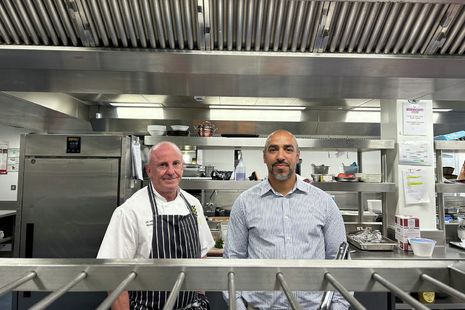Humans of Cambridge: The changing life of the college chef
Ben Curtis speaks to Lee Howell and Ricardo Soares of Caius to reveal the uncharted world of college catering

Observing the kitchen at Gonville & Caius, Head Chef Lee Howell turns to me and says: “I still had my hair when I started working here!” He’s been at Caius for 22 years and counting, seen the catering programme “modernise in every way,” and is currently gearing up for another Michaelmas term. Despite a hectic schedule he describes as “a little bit of juggling,” he and Head of Catering Ricardo Soares found the time to talk through the lesser-known life of College catering.
Neither Howell nor Soares found themselves in Cambridge by chance. Before taking up his role, Soares worked in London “opening restaurants and changing how things were done,” introducing “new concepts, new ideas”. When Caius called, looking for a Director of Catering, he tells me “I didn’t know what a Cambridge college was, I didn’t know what it was about,” but what ultimately appealed was that “they wanted someone to come in and change things”.
Soares inherited equipment “first installed in the 1960s” and oversaw a “long-overdue” upgrade. He tours me round the kitchens: a stainless steel rabbit warren hidden beneath the grandeur of Caius’ wood-panelled dining hall. Soares is proud of how it’s progressed: he points out a new lift here or a more efficient oven there, his enthusiasm seems undiminished even after eight years.
“It all sounds rather stressful, though Howell laughs and assures me it’s a ‘walk in the park, really’”
Howell has seen all of these changes through to fruition. He left school at 16 and joined Churchill College as an apprentice in their kitchens, and besides a brief period working in hotels, he tells me that he’s “been in colleges for pretty much my whole career”. At Caius he worked his way up from his first role as section chef in “the larder making sandwiches and baguettes”.
You get the impression he’s rarely out of his chef whites. With a smile, he tells me it’s been “a long haul, but worth it”. In recent years they moved away from “very old fashioned” silver service, waiters serving food from trays at the table, and both Soares and Howell agree that, even in the antiquated realm of formal hall, “everything has come into the 21st Century”.
You’d be forgiven for assuming the fellowship of any college is broadly resistant to change, and Soares certainly did when he first joined. For him “all the warnings [from] people” were how “[the fellows] don’t like change”. Though Soares found them to be “receptive,” and that they “embraced” what he was trying to do. It seems people just want good food, and Howell reiterates how high he has seen the standard raised: “It’s totally changed, it’s much more healthy, more balanced.”
Asked how the food used to be, Howell responds, slightly diplomatically, “it wasn’t horrible!” The food was “rich,” and “cheap and convenient,” with what Soares calls a “bit of a mismatch” between the offerings for students and fellows. Both are proud to have changed this, and remain keenly aware of the students at the heart of any college. “They’re why we’re here,” Howell tells me, and Soares is quick to add that they are “the College’s bread and butter”.
“If you go out for a meal, you don’t sit there and think woah, I bet [the chef’s] had a tough week”
With typically six formal hall offerings a week, and a daily cafeteria service, Howell and Soares’s team of around 13 chefs and close to 40 service staff are certainly kept busy. Undergraduates are expected to dine on 31 evenings in Full Term, and Soares tells me that “there’ll be anything from 144 [students] for cafeteria to 180 [students] for formal halls straight afterwards,” leaving only “half an hour” for the team to turnaround service. It all sounds rather stressful, though Howell laughs and assures me it’s a “walk in the park, really”.
Howell has the confidence that only 22 years of experience can give you, but both point out that “the administration of [their jobs are] quite heavy”. Howell tells me that “a big part of kitchen life” is “ordering” produce, done on a daily basis, and sorting the rotas for the following week – all while continuing to provide regular service. The work that goes into each course of a formal dinner goes, they admit, mostly unseen by students, but it doesn’t seem to faze them: “If you go out for a meal, you don’t sit there and think woah, I bet [the chef’s] had a tough week!”
Where their satisfaction does come from, though, is pretty clear. Soares enjoys the feeling of a job well done, hearing that “the food is really good and […] telling the chefs […] being proud of what [they] do”. And as Howell says, “we are chefs at the end of the day […] my goal and my focus is good food on a plate”. They both enjoy the opportunities they’ve had to change things “for the better,” but retain a fondness for the unique, social “tradition” of a formal hall: “bringing people together through food is what we focus […] on,” Soares proudly tells me.
Their roles are fast-paced and “hairy,” though not without entertainment. When asked if any moments stand out they exchange a wry smile and tell me “[We] probably shouldn’t say!” As I’m led back through the kitchen I see the team setting up to begin evening service, every surface polished to within an inch of its life. There’s no time to waste, with an Installation dinner and two four-course Matriculation formals to prepare for. Lee says “it’ll be Christmas before you know it”.
 News / Judge Business School advisor resigns over Epstein and Andrew links18 February 2026
News / Judge Business School advisor resigns over Epstein and Andrew links18 February 2026 News / Hundreds of Cambridge academics demand vote on fate of vet course20 February 2026
News / Hundreds of Cambridge academics demand vote on fate of vet course20 February 2026 News / Petition demands University reverse decision on vegan menu20 February 2026
News / Petition demands University reverse decision on vegan menu20 February 2026 News / CUCA members attend Reform rally in London20 February 2026
News / CUCA members attend Reform rally in London20 February 2026 News / Gov grants £36m to Cambridge supercomputer17 February 2026
News / Gov grants £36m to Cambridge supercomputer17 February 2026










